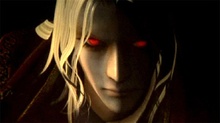Once upon a time, Activision Blizzards CEO Bobby Kotick kicked a few franchises to the curb: Riddick and Ghostbusters. No doubt, this was a result of the Activision and Blizzard merger requiring some resources to the merged together while others were cut from the lineup. Phil Harrison, the new big suit at Atari/Infogrames has raised these little birds from the ashes with a dream to build them into 100-million dollar franchises.
 While Bobby Kotick said the titles, “don’t have the potential to be exploited every year on every platform with clear sequel potential and have the potential to become $100 million dollar franchises,” Phil Harrision sees it as a personal challenge to prove him wrong.
While Bobby Kotick said the titles, “don’t have the potential to be exploited every year on every platform with clear sequel potential and have the potential to become $100 million dollar franchises,” Phil Harrision sees it as a personal challenge to prove him wrong.
“What Bobby, perhaps unhelpfully said, was that those games were franchises which wouldn’t make $100m of revenue and generate sequels. If that’s his benchmark, then fine — and we’d love to aspire to the same benchmarks. But you know what? I would love to turn Ghostbusters into a $100m franchise, just to prove him wrong.” (1up)
In many ways, this is the difference in attitudes from a large firm compared to a smaller firm with strong goals and a vision for success. Activision Blizzard is big now, perhaps the biggest publisher in the industry, they can’t be bothered with minuscule 80-million dollar franchises. Others, like Atari, strive to take a title from nothing to something of greatness. Granted, Atari’s failed in a lot of franchises, but with their new ex-Sony executive behind the helm things could turn around and this might be the first step.
Most of the best game franchises in existance today started from nothing but a dream. Big publishers don’t have time to dream, they’re too busy making money off the fanboys of their current franchises.

 The Castlevania series was born in Japan on September 26th back in 1986. That knowledge in hand, you can imagine the demographic of 30+ year old gamers who would kill to get an old school franchise title on a new graphic intensive console.
The Castlevania series was born in Japan on September 26th back in 1986. That knowledge in hand, you can imagine the demographic of 30+ year old gamers who would kill to get an old school franchise title on a new graphic intensive console.
0 thoughts on “Phil Harrison’s Building a 100 Million Dollar Franchise”